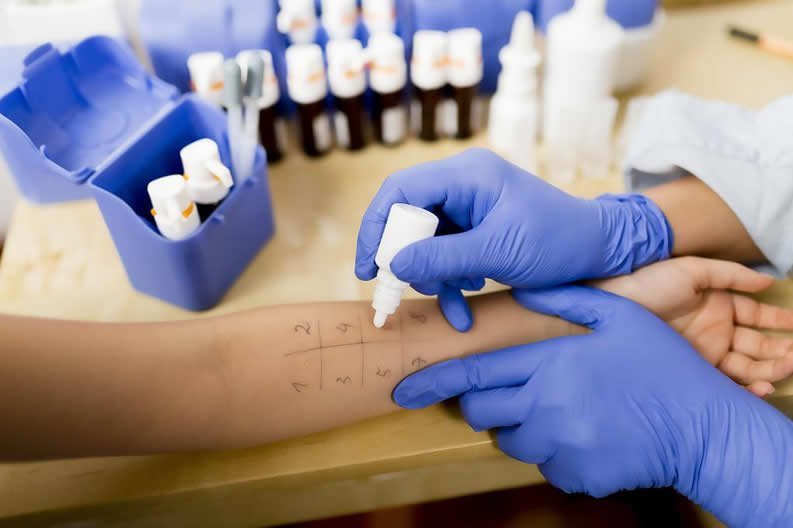
What is an Allergy Blood Test?
An allergy blood test measures a substance called immunoglobulin E (IgE) in your blood. IgE is an antibody that your body makes. If you have allergies, you may have more IgE in your blood than normal. Allergies are a common, long-term condition that involves your immune system. Your immune system makes antibodies to fight off viruses, bacteria, and other things that can make you sick. With allergies, your immune system treats one or more harmless substances, such as pollen or peanuts, as a threat. To fight the “threat,” your immune system makes IgE antibodies. This is what causes your allergy symptoms. Harmless substances that may cause allergies are called allergens. Common allergens include:
• Pollen
• Dust
• Mold
• Animal dander
• Certain foods, including nuts and shellfish
• Certain medicines, such as penicillin.
Allergy symptoms depend on the type of allergy you have. They can range from itching and sneezing to asthma or a life-threatening condition called anaphylactic shock.
Other names: IgE allergy test, Quantitative IgE, Immunoglobulin E, Total IgE, Specific IgE, RAST, CAP, ELISA
What is it used for?
Allergy blood tests are used to help find out if you have an allergy. There are two general types of allergy blood tests:
- A total IgE test is used to measure the total amount of IgE antibodies in your blood.
- A specific IgE test measures how much IgE your body makes in response to a single allergen. A separate test is done for each allergen that may be causing your allergies.
Why do I need an allergy blood test?
Your health care provider may order allergy testing if you have symptoms of an allergy. These include:

• Stuffy or runny nose
• Sneezing
• Itchy, watery eyes
• Hives (itchy raised red patches on the skin)
• Diarrhea
• Vomiting
• Shortness of breath
• Coughing
• Wheezing
Your provider may choose to order an allergy blood test if you can’t have allergy skin testing. Skin testing involves putting allergens directly on or into your skin. You may not be able to have skin testing if you:
• Have certain skin conditions
• Take certain medicines that may affect the results of the test
• Are likely to have a serious allergic reaction to the allergens used in skin testing
In certain cases, providers may order allergy blood tests for young children, because skin testing may be too uncomfortable for them.
What happens during an allergy blood test?
A health care professional will take a blood sample from a vein in your arm, using a small needle. After the needle is inserted, a small amount of blood will be collected into a test tube or vial. You may feel a little sting when the needle goes in or out. This usually takes less than five minutes.
Will I need to do anything to prepare for the test?
You don’t need any special preparations for an allergy blood test.
Are there any risks to the test?
There is very little risk to having an allergy blood test. You may have slight pain or bruising at the spot where the needle was put in, but most symptoms go away quickly.
What do the results mean?
A total IgE test result that is high means that you may have some kind of allergy. But the results of a total IgE test don’t show what you’re allergic to or how serious your allergy may be. A specific IgE test result that is high means that you may be allergic to the allergen that was tested. But the amount of IgE measured doesn’t predict how serious your allergy may be. If the results from either type of test show that you could have an allergy, your provider may refer you to an allergy specialist or recommend a treatment plan. Your treatment plan will depend on what you are allergic to and how serious your symptoms are. If you’re at risk for anaphylactic shock, you’ll need to be very careful to avoid the things you are allergic to. You may need to carry an emergency epinephrine treatment (an epinephrine auto-injector) with you at all times. Anaphylactic shock is most common with allergies to certain foods, medicines, insect stings, and latex. Ask your provider if you are at risk for anaphylactic shock and discuss any questions you have about your test results or your allergy treatment plan. Learn more about laboratory tests, reference ranges, and understanding results.
Is there anything else I need to know about an allergy blood test?
Allergy blood tests may not always be accurate. Sometimes the results may say you have an allergy when you actually don’t (also known as a false positive). This may happen if your body is having a slight reaction to substances in certain foods that you may have eaten before the test. It’s uncommon for a blood test to show that you don’t have an allergy when you actually do (also known as a false negative).
Depending on your medical history and symptoms, your provider may order an allergy skin test with an allergy blood test, or you may have a skin test alone.
Show references
• Allergy
• Food Allergy
• Hay Fever Related Medical Tests
• Allergy Skin Test
• Celiac Disease Screening
• Food Allergy Testing
• How to Cope with Medical Test Anxiety
• How to Understand Your Lab Results
• Rash Evaluation
• What You Need to Know About Blood Testing
The information on this site should not be used as a substitute for professional medical care or advice. Contact a health care provider if you have questions about your health.
Was this page helpful?
yes no
• Subscribe to RSS
• Follow us
• Social Media Toolkit
• NLM Web Policies
• Copyright
• Accessibility
• Guidelines for Links
• Viewers & Players
• HHS Vulnerability Disclosure
• MedlinePlus Connect for EHRs
• For Developers
House no 7, Gali no 1, 100 feet road, Hardev puri Nathu chowk, Shadhara Delhi 110093



